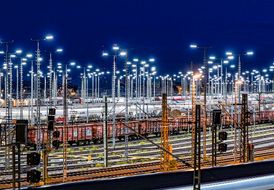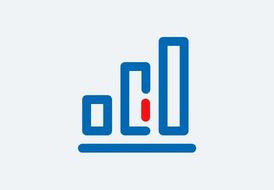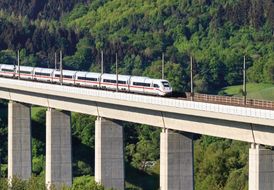Human Resources
To implement the Strong Rail strategy, we rely on adequate equipment and qualified, skilled employees. DB Group has a high annual need for new employees. This is reinforced by the age-related retirement of numerous employees as well as the elective model for working hours agreed under collective bargaining agreements.
Due to demographic changes and the associated lack of skilled employees, it is becoming increasingly difficult to fill vacancies with qualified employees. This in turn results in risks such as low personnel coverage to safeguard ongoing business and the long-term loss of knowledge, especially for railway-specific professions.
We are counteracting these risks in particular by improving our employer attractiveness, implementing extensive recruiting measures, redesigning vocational and functional training (retraining), and expanding and digitalizing the qualification capacities and measures for strategic succession planning as well as for effective knowledge management.
In addition, automation potential must be tapped in order to counteract the risks of a shortage of skilled employees.
Increased cross-generational and intercultural cooperation as well as a general framework to equalize the participation of men and women within DB Group reduce the risks that result from a change in employee structure and increase employer attractiveness. This is where our diversity management comes in with the Group initiative “Uniquely Different” (“Einziganders”) and the strategic program “Women in Management Positions” (“Frauen in Führungspositionen”).
Against the backdrop of economic crises with unclear prospects, the personnel cost structure plays an important role in recruitment. In terms of the labor market and transport market, our target is therefore to always conclude competitive collective bargaining agreements. Additional pressure on the development of wages can be expected from the surge in prices.
The agreement between DB Group and the Railway and Transport Workers Union (Eisenbahn- und Verkehrsgewerkschaft; EVG) and the German Train Drivers’ Union (Gewerkschaft Deutscher Lokomotivführer; GDL) has made it possible to conclude collective bargaining agreements that express appreciation for employees while at the same time safeguarding the future viability of the Integrated Rail System.
DB Group’s digital transformation is critical for the successful implementation of the Strong Rail strategy. The digitalization of DB Group must be driven forward in a way that maintains the employability of our employees. The challenge is to identify the emerging changes in professions and job profiles in a timely manner and to address the resulting implications for qualifications and training accordingly. To this end, we are developing future prospects for railway professions in an R-Future Lab, among other things, and updating the content of our qualification offerings and programs.
In the course of digital transformation, business-critical knowledge and competencies are becoming more diverse, and in many places more specific and fast-paced. This is placing new demands on our qualification and knowledge architecture. The challenge is to get new employees up to speed quickly, to facilitate access to relevant knowledge and thus to empower employees from all working areas and from different generations to be equally capable in a changing working environment. Accordingly, we are looking ahead and developing a modern knowledge architecture in the context of a learning ecosystem within the framework of the “Learning@DB” project.
Another challenge is to promote digital cooperation, innovative strength and resilience in the context of a modern corporate culture. Major risks could arise if we as a company were unable to react flexibly to the changing requirements of a volatile market environment and failed to meet our employees’ requirements in a modern working environment. We counter this by driving forward modern working environments as part of numerous programs, initiatives and communities within DB Group, for example “People. Make.The Future.”, “Digital transformation”, “Mobile working of tomorrow”, the “New forms of cooperation” R-Future Lab, the internal “Agile Islands” (“Agilen Inseln”) network and the Office 365 Supported Learning Community.
The digitalization of the working environment, new forms of cooperation, but also increasing potential for social debate and conflict mean that the number of demands placed on executives is increasing. In order to provide our executives with the appropriate competencies and methods in the future, we are further developing the training and further education program for executives at the DB Academy to create a new leadership program.



